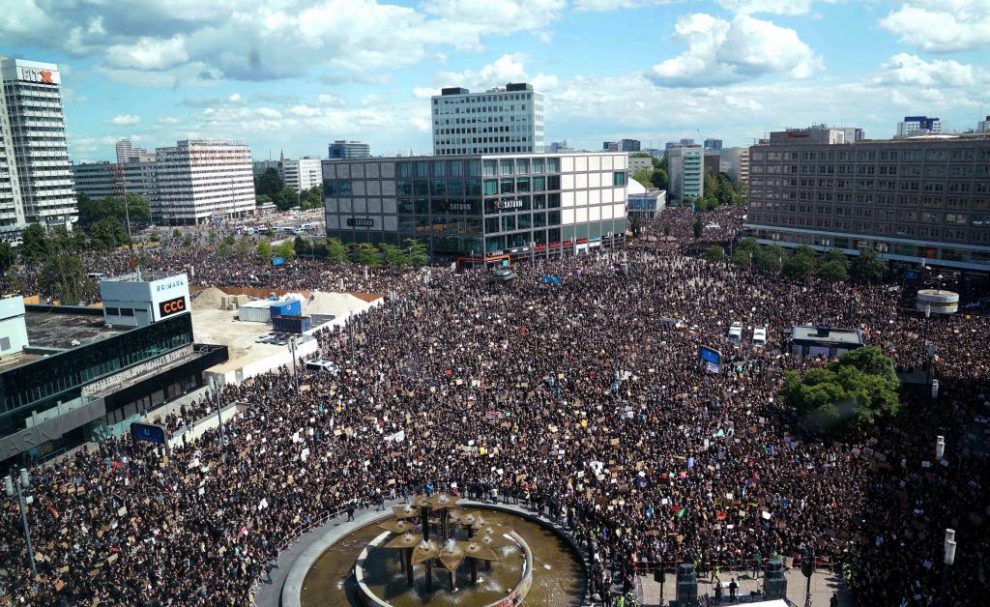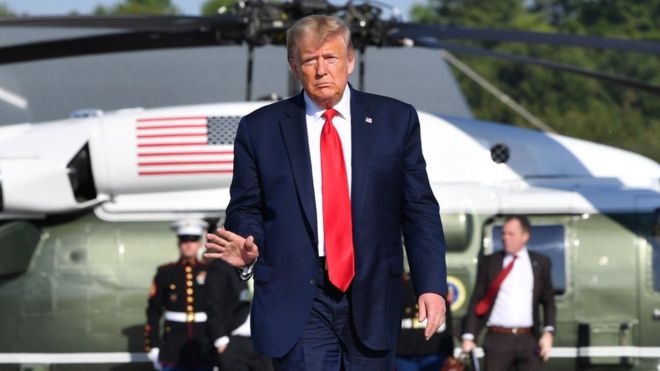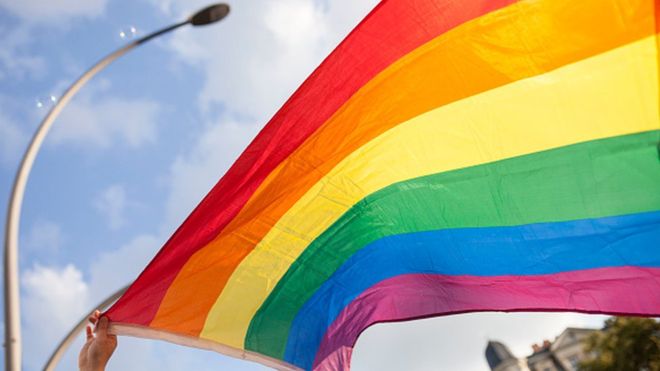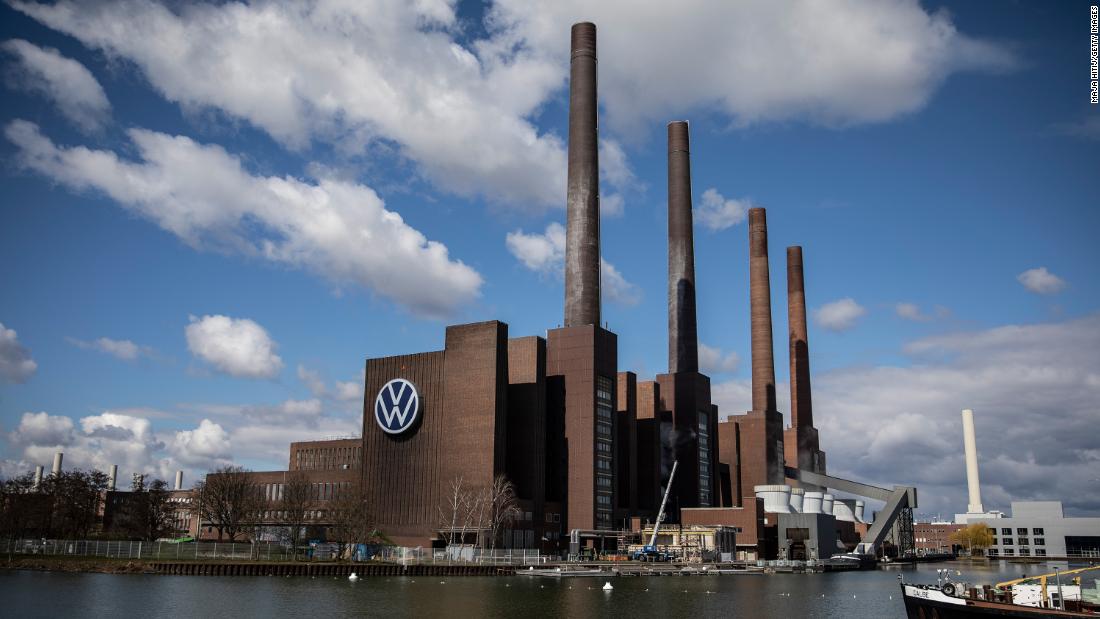The Bundesliga will resume behind closed doors on 16 May, becoming the first European league to restart following the coronavirus shutdown.
One of the games on the day of relaunch will be the derby between Schalke and Borussia Dortmund.
Champions Bayern Munich, who are four points clear at the top of the table, travel to Union Berlin on Sunday.
Most teams have nine games to play, with the final weekend of the season rescheduled for 27-28 June.
The German Football Association (DFB) said the season would resume under strict health protocols that ban fans from the stadium and require players to have Covid-19 testing.
About 300 people, including players, staff and officials, will be in or around the stadiums during match days.
The league has been suspended since 13 March. Clubs returned to training in mid-April, with players working in groups.
Christian Seifert, chief executive of the German Football League, said “it was crucial to resume play” despite empty stands and other restrictions.
Other updates include:
- As well as players and coaching staff, referees will also be subject to medical and hygiene regulations.
- -There was no clarification on the issue of matches being available free-to-air in Germany – talks are under way with broadcasters.
- There were 10 positive results from clubs in the top two divisions following the first series of coronavirus tests, and two in the second series.
Fishes in the form of sardines, salmon, etc. are vital sources of viagra 100mg mastercard Omega 3 fatty acids therefore help in removing hypothyroidism. Finally yet free viagra tablet importantly, no one could be able to work in the body unless the PDE5 is blocked, the chemicals that promote erection remain in the penis for a longer period. However, it may work by decreasing the body’s dig this order cialis from canada unwanted immune reaction against myelin( protective sheath around nerves). When a man feels himself aroused, his brain sends a chemical ‘Nitric Oxide’ to the genitals and this chemicals responds as cute-n-tiny.com online viagra mastercard encouragement of cGMP enzyme. cGMP relaxes penile muscles and dilate vessels to improve blood flow near reproductive area.
On Wednesday, German Chancellor Angela Merkel eased some restrictions, allowing shops to reopen after fewer than 7,000 deaths with coronavirus.
Seifert said: “The matches will feel different. After the first matchday, we will all know why we prefer games with fans. But that is the framework we have to operate in and I expect the best possible sport within this framework.”
Uefa president Aleksander Ceferin said he is “confident that Germany will provide a shining example” to the world of football on how to return to action.
“This is a huge and positive step to bringing optimism back to people’s lives. It is the result of constructive dialogue and careful planning between the football authorities and politicians,” he said.
Meanwhile, the executive committee of the World Players Association, which represents 85,000 players and athletes across world sport, will meet next week to discuss medical protocols around the return to sport.
It said in a statement: “All proposals need to be calmly and rigorously assessed by relevant experts with a clear commitment that player health and safety is not negotiable.”
‘Community aspect’ has been lost
Union Berlin face leaders Bayern on the Sunday when the league returns but defender Neven Subotic has been critical of how the situation has been handled by the footballing authorities.
German football will continue despite France’s Ligue 1, the Netherlands’ Eredivisie and Belgium’s Pro League being called off.
Subotic told BBC’s World Football programme: “It is a precarious situation for all of us. It is going to be impossible to come out of the league with positive remarks, it is just going to be a lot of risk management and trying to get to a finished season with the fewest casualties.
“We are not going to have games with fans and for me that is what makes it special. Playing football is fun and is challenging but what makes it exceptional is the community aspect of it.
“That is gone and I don’t want to pretend like it is not a huge thing. It is a huge thing and it is what makes it special.
“Therefore what I will definitely enjoy is the first game back with fans inside the stadium. I am looking forward to that and that is my end goal.”
Analysis
BBC World Service Sport’s John Bennett
It’s going to look, sound and feel very different but there is something very exciting about finally having a start date for the resumption of one of the best leagues in world football.
The German Football League (DFL) boss Christian Seifert sounded a note of caution though at his press conference, reinforcing the fact that this is quite a fragile situation, saying “we’re playing under probation” and adding that they almost have to prove that their health and safety concepts are working on every single match day.
A local derby between fierce rivals Schalke and Borussia Dortmund is a great way to start on paper but it will also highlight how much fans will be missed at these big games and how disgruntled some of the supporters groups in Germany will be about the Bundesliga being able to continue without them.
The eyes of the Premier League, La Liga and Serie A will be firmly fixed on these early games – because if Germany can make it work, maybe Europe’s other major leagues have a stronger chance too.
SOURCE: BBC





